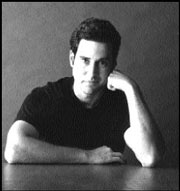THE FROG KING: A LOVE STORY
by Adam Davies
(Riverhead Books, $13)
University Book Store, 4326 University Way N.E., 634-3400
7 p.m. Mon., Aug. 19
Consider what it would be like to spend an evening with a guy who says stuff to his girlfriend like, “Hey, Eves, you know how I’d feel without you? Eviscerated.” Sound irritating? Try 322 pages of it.
The Frog King is one more novel about a disaffected young editorial assistant casting a jaundiced insider’s eye on the New York publishing world while indulging in a lot of substance abuse, self-pity, and tail chasing. The classic of this genre, Bright Lights, Big City, was published almost 20 years ago (and like The Frog King, released only in paperback); but where Jay McInerney’s coke-fueled second- person narrator had a certain laconic allure, the protagonist of The Frog King is a shallow word geek named Harry who won’t shut up.
Harry’s gorgeous and inexhaustibly witty girlfriend, Evie, fantasizes about the “beautiful and brilliant and kind” children they could have together, but Harry wants none of that. “I detest clich鳠and love is the biggest clich頯f them all,” says Harry. “It’s the Henry Fordization of emotion.” He especially hates the film Love Story, which he’s never seen, and complains about it with typically sarcastic, Chandler-esque flair (as in the Friends character, not the detective novelist). Evie says, “Sometimes your levity belies a real inner vacuum of profound loneliness and desperation.” Hard to argue with that, except for the “profound” part.
Lacking the depth, edge, and acute sense of place that marked Bright Lights, Big City, Adam Davies’ The Frog King is sitcomy all the way. A first-time author and onetime Random House editorial assistant, Davies subjects his hero to a predictable learning curve—the story is subtitled “A Love Story,” so you know where it’s heading—and enforces an exhaustive wackiness that’s as impressive, and wearying, as Harry’s own.
There’s Birdie, the singularly waggish young homeless-girl-with-a-heart-of-gold who lives in a box by Astor Place and greets Harry with comments like, “Why you looking so Ezra Pound?” There’s his co-worker, Jordie, whose relationship with Harry consists of playing “logomachy,” in which they attempt to stump each other with obscure words like “nepenthe” and “misoneism.” And Harry and Evie’s love affair is made up of adorable routines and shared jokes—Treehouse Talks, Rapunzel treats, playing Madame Bovary, and on and on. This novel doesn’t portray life; it tries to package it.
Which isn’t to say that Davies isn’t a clever writer—he’s just not a very interesting novelist. His Harry’s got loads of fresh metaphors good for capturing moments of romantic thrill. In one scene, Harry prepares to sneak some nookie with Evie in the dressing room of a fancy clothing store: “I can barely contain myself. I have an embarrassing loper—an interloper, a porrection, a half-hard-on—pushing through my pants. I’m so excited, so full of roiling sexual urge but also of sheer effervescent joy, that I feel like I want to burst into some wild act of madcappery. I could vault over parking meters, dance on car roofs in the spray of opened hydrants, leap from a parapet while holding on to a banner and evading the hapless soldiers of an unjust king. I could Riverdance I’m so happy.”
Frog‘s got its certain contemporary dialect down, annoying as it is. (“Come on. Spillez-vous,” says Evie, pressing another character for information.) And the arch formality of the e-mail argot will be familiar to anyone who currently works in an office.
Yet except for two references to “some Internet shit” and one to Madeleine Peyroux (jazz/pop singer circa 1996), the book is weirdly not of our time, or any time. While it’s a refreshing change from fiction that simply strings together topical references, it seems odd for a book like this to exist in a political- cultural vacuum.
Everything is rounded and overdetermined, all the ironies neatly and laboriously constructed. Evie leaves him (finally) for Mr. Clich頨imself—an author of a book of Mars-Venus-type love advice—forcing Harry to at last confront his own fear of love. (“So I’m the clich鿠Is that what you’re saying?”) See how it all comes around? There are no loose ends because everything’s meticulously storyboarded: If the “Animal Want Woman” boxer shorts have been mentioned once, you know they’ll be back, served with a twist of irony.
It might all be worthwhile if the author and protagonist didn’t seem so indistinguishable, if the one didn’t seem to be laboring just as hard as the other to prove himself the cleverest boy in class. Had Harry been placed at the center of a novel that had a little more detachment—perhaps with a third-person voice—there might have been some traction here. As it is, the book tries to be a moral tale about narcissism, but it ends up just being another exercise in it.









